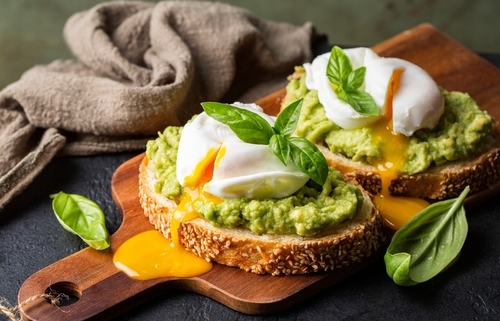ADT and a Plant-Based Diet
Can a plant-based diet minimize the adverse effects of androgen deprivation therapy (ADT) in advanced prostate cancer? Some investigators believe it can. In fact, they believe it could even be life-changing, and are conducting a study to find out more.
If you are on ADT, before you even lift a fork to your mouth, you’re already behind the eight ball: You’re predisposed to gain weight. You’re also more likely to lose muscle mass, and to undergo changes in metabolism that could lead to insulin resistance, diabetes, and cardiovascular disease. And it’s not your fault. These are simply known, predictable outcomes of having very low levels of male hormones in your body.
A poor diet – one heavy in carbs, sugar, fat, and the many chemicals found in processed food – can worsen all of these effects. But wait! Could the reverse be true? Could a major change to the diet help minimize ADT’s undesirable consequences? I recently interviewed David Nanus, M.D., a medical oncologist at Weill-Cornell, for the Prostate Cancer Foundation (PCF). PCF scientists believe such a diet could not only minimize some of ADT’s side effects, but that it might even be life-changing. They recently funded a study to find out more.
The key to this encouraging study is six months of a “whole-food plant-based diet.” What is that, exactly? Does “whole food” include meat, fish, or chicken that’s not processed? No, it does not. No animal products, no meat, milk, cheese, eggs, or seafood. Furthermore, no added sugars or white flour, no processed cooking oils (oils high in trans fats, polyunsaturated fats, or oils that are highly refined, such as corn, canola, or safflower oils). No processed food chock full of additives. No empty calories. No junk.
That’s a lot of “no.” But consider the long list of “yes” food: fresh and cooked veggies, fruits, whole grains, beans, nuts, olive oil, herbs, and a vast array of spices. In this diet, everything you eat is good for you and good for your heart – and this means it might even help your body fight the cancer.
“It’s not a vegetarian diet; it’s not even vegan: it’s more than vegan!” says Nanus. He is Principal Investigator of this study, along with medical oncologists Channing Paller, M.D., of Johns Hopkins, and Mark Stein, M.D., of Columbia University. “The whole-food, plant-based diet is the antithesis of processed food.”
Note: a diet is not automatically healthy just because it omits meat. For example, Nanus explains, “you can have a Snickers bar or eat a bag of Doritos and think, ‘Hey, it’s vegetarian!’ A whole-food, plant-based diet doesn’t just include food that is good for you: it contains zero food that is not good for you. It also promotes satiety – that feeling of being full.
When men first start the study’s diet, “they look at the portions and think, ‘Really? That’s it? That’s my lunch?’” says Nanus. “But then you eat it, and think ‘Wow, I’m full!’ If you eat the right food, it turns off that message in your brain that says ‘I’ve got to eat more!’ With junk food, you’re never satisfied. It’s not meant to satisfy you.”
Excess Weight and Prostate Cancer
This trial is aimed at men who begin ADT when they are already carrying around excess weight (men with a body mass index (BMI) of 27 or higher). “If you’re overweight and you have prostate cancer, you have a worse prognosis,” says Nanus. “Your prostate cancer is more likely to be aggressive, and you’re more likely to die of it.” Note: This risk starts to lower immediately when men lose weight. “More than that, when we put men on ADT, we make things worse. Even if you’re thin, our therapies make you gain weight and lose muscle mass.”
Men on ADT are more likely to develop a set of conditions known as metabolic syndrome: higher blood pressure, a rise in blood sugar, extra fat around the midsection, higher triglycerides and lower amounts of the “good” cholesterol, high-density lipoprotein (HDL). “As your blood sugar goes up, you’re more likely to get diabetes and heart disease – and the number one cause of death in men with prostate cancer is cardiovascular disease,” says Nanus.
This weight gain and loss of muscle mass happens even in men who are only on ADT temporarily, Nanus adds. “It happens pretty quickly. As doctors, we will say, ‘You need to lose weight. You need to exercise.’ But it’s the occasional man who loses weight. Most men try, but they’re not so successful and they gain weight.”
This may be because the average American diet is rich in processed food – everything from packaged lunchmeat to breakfast cereal to canned soups, sloppy Joe and pasta sauces, to boxed “helper” meals (just add meat) and cake mix, to frozen entrees and pizzas. “If it’s got more than five ingredients, don’t eat it,” advises Nanus. “It’s full of preservatives.”
The study includes “a lot of coaching,” he continues, “explaining to the patients what they should be eating, and how to break that 11 o’clock bedtime craving for snacks, cookies, or ice cream.”
How the Study Works
This is a randomized trial, divided into a control arm and an intervention arm. The men in the control arm are encouraged to eat a healthy diet, and they, too, receive several weeks of nutritional counseling. “In both arms, we keep in touch with the patients to see how they are doing. Both groups have free access to a nutritionist.”
The men in the study’s trial arm get extra help in the form of prepared whole-food, plant-based meals. “For the first month, they get 12 meals a week,” says Nanus. “That’s lunch and dinner six days a week.” For the second month, the men receive six meals a week with more coaching. For the next four months, “you’re basically on your own, with a lot of literature on what to eat for meals and snacks, and then at six months, we reassess. Did this intervention stick? Did you continue to lose weight?”
The meals contain “a lot of whole grains, soups, whole grain pasta, no additives – very healthy meals,” says Nanus. In addition, “you can eat as much salad as you want.”
But what about when the rubber hits the road – when men have to come up with and prepare their own meals? No worries! There’s plenty of support: suggestions and recipes for easy meals that men can make themselves. Here, for example, is a sample breakfast with just three ingredients: Avocado toast made with Ezekiel whole-grain bread (available in the refrigerated or frozen section of many grocery stores), smashed or cut-up avocado, and diced tomato. Optional: dress it up with a diced clove of garlic, a squeeze of lime, some chopped basil, dill, or parsley, and a thin-sliced radish. It’s not only delicious; it’s filling!
Good news for wine drinkers: men in both arms of the study can still drink wine, but are asked to limit it to one or two glasses a week. Also, men are asked not to increase their normal level of exercise. If they are fairly active, fine; if not, that’s fine, too – “just keep doing what you’re doing,” says Nanus. This is so investigators can determine whether the weight loss and other changes are actually coming from the diet, and not from another other major lifestyle change.
Can this Diet Lower Inflammation and Alter the Gut Microbiome for the Better? What else changes besides weight?
Although the main endpoint of the study is weight loss – “a simple thing to measure,” notes Nanus – “there’s a lot more to it.”
The study’s investigators will also be looking at markers in the blood to see if the level of inflammation changes. (Inflammation is linked to many chronic illnesses, such as heart disease and even cancer.) They will measure cholesterol, and also carotenoids – pigments naturally found in plants that are “an indirect way of measuring how much fruit and vegetables you are eating; it’s a way to tell if you’re sticking to the diet or not.” Men will also complete questionnaires about their diet and quality of life.
In collaboration with Johns Hopkins scientist Karen Sfanos, Ph.D., the participants’ stool samples will be analyzed, looking for metabolic changes and alterations in the microbiome, the population of gut bacteria. Men in the study will also have three DEXA scans to measure bone density and body fat. Although blood and stool specimens will be taken throughout the study, “unfortunately, we can’t measure many of the blood and stool markers until the last patient has completed the study,” Nanus explains. “It has to be batch-measured – run at the same time for quality control, to make sure the standards are the same in every patient, and from patient to patient.”
That said, “we did do some preliminary analysis with the first 40 patients in the trial,” says Nanus, “and we have seen significant differences. There’s no question: we could see that patients who are in the treatment arm lose weight, feel good, and keep going longer. Not everybody loves the (prepared) food.” Some men do love it. Some men, after the six months, “will go back to including a little fish and the occasional meat, and we’re okay with that.”
One man “went off the wagon over Christmas, then went back on. He didn’t gain any weight over the holidays, and went back to the diet.” Another man, a patient of Nanus’s, came late to the diet. “He didn’t want to give up his beer.” But he also kept gaining weight. He started the whole food, plant-based diet and lost 20 pounds. “We have a number of men who just stay on the diet after the six months. It changes their lives,” and also the lives of the spouses or partners – many of whom “go on the journey with them,” he notes. Nanus went on the diet himself for one month with home-delivered meals – “so I’m not asking patients to do something I wouldn’t do. It did change the way I eat, and I lost 10 pounds over that month!”
Living with the effects of ADT is a challenge that didn’t even exist a couple of decades ago. “It used to be that we didn’t worry about medical issues like elevated blood sugar in our patients with metastatic prostate cancer, because the men weren’t going to live that long,” says Nanus. “Today, many men with metastatic prostate cancer are going to live for many years, so we have to address their survivorship – not just surviving cancer, but surviving with cancer.”
Nanus expects to complete enrollment in the trial this fall, and to analyze the data within the next year. If you are interested in learning more about the trial, go to clinicaltrials.gov. Note: This is an East Coast-based trial. Participants must be able to travel either to New York City or Baltimore.
In addition to the book, I have written about this story and much more about prostate cancer on the Prostate Cancer Foundation’s website, pcf.org. The stories I’ve written are under the categories, “Understanding Prostate Cancer,” and “For Patients.” As Patrick Walsh and I have said for years in our books, Knowledge is power: Saving your life may start with you going to the doctor, and knowing the right questions to ask. I hope all men will put prostate cancer on their radar. Get a baseline PSA blood test in your early 40s, and if you are of African descent, or if cancer and/or prostate cancer runs in your family, you need to be screened regularly for the disease. Many doctors don’t do this, so it’s up to you to ask for it.
© Janet Farrar Worthington




Leave a Reply
Want to join the discussion?Feel free to contribute!